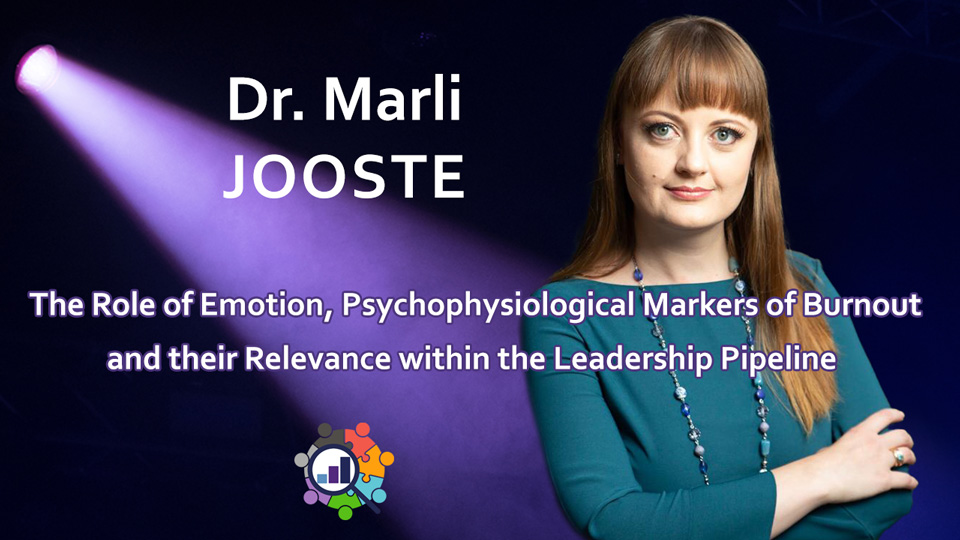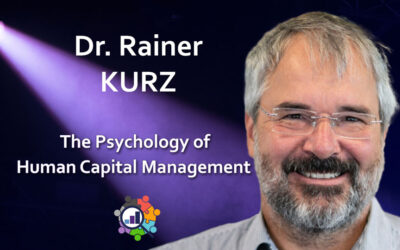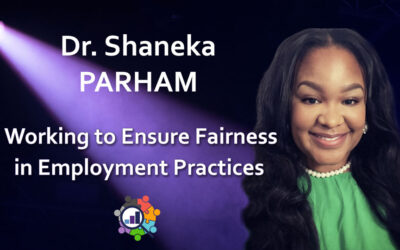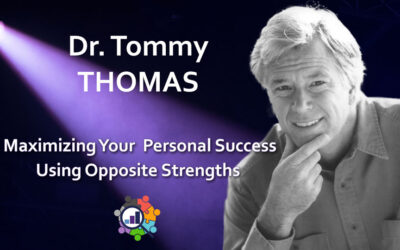A CykoMetrix Spotlight Production
Every week, the Spotlight shines on an amazing professional with a story to tell and lessons to teach. Welcome to the CykoMetrix Spotlight.
The following is an adapted transcript of the exchange between Sylvain Rochon, CMO at CykoMetrix as host, and Dr. Marli Jooste, Professional psychology practitioner & personal growth activist.
Sylvain Rochon: Welcome to Psychometric Spotlight. My name is Sylvain Rochon, I’m the Chief Marketing Officer at CykoMetrix, a SaaS-based psychometrics software service that measures team effectiveness and accompanies a consulting training company, and staffing companies on their journey to generate excellent development inside workplaces through repeat psychometric tests and training to improve soft skills and develop people into amazing and effective employees.
I am here today with this guest Dr. Marli Jooste. She’s a professional psychology practitioner and personal growth activist. She’s amazing. I just told her a story about an article I happen to discover on the internet that she wrote, no planning at all. She’s everywhere. I really like her. I am really looking forward to speaking with her. She’ll tell you more about her just for context.
What she does is she helps people find their true north. I’ll let her talk to you about what that means exactly. Essentially, Dr. Jooste left the corporate world working in human capital in 2011 to chase her own business opportunities. She has a PhD in Psychology from the University of Pretoria, South Africa, and is the Director of the PhysEQFIT Guesthouse, which is pronounced “physique fit guesthouse”.
She has been awarded as the country and regional winner of the CEO Global Top Pan African Awards as part of Africa’s most influential women in business and government within the SME sector. That is a mouthful, Dr. Jooste. But also she’s been a recipient of the Panache 6th Annual Gauteng Women of Wonder and Visionary I Conquer Awards. These awards are very impressive, I can’t pronounce “Gauteng” properly, but I know that’s Afrikaans, probably. Welcome, I’m so happy to see you, Dr. Jooste. And you have an amazing topic as well. Glad for you to be here.
Dr. Jooste: It’s a warm South-African good afternoon from my side.
Sylvain: There you go. Excellent! Now, you are a professional health practitioner , and the theme for today is very exciting because it is essentially the subject of your thesis. I assume your PhD thesis, not your master’s thesis. It is The Role of Emotion, Psychophysiological Markers of Burnout and Their Relevance within the Leadership Pipeline. It sounds like a mouthful but is extremely relevant in the modern workplace. Don’t you think?
Dr. Jooste: I think definitely. I think that is even beyond the whole global pandemic of COVID. I think, that is just to reaffirm the need for such studies and for such interventions within corporate, within our private lives, right through.
Sylvain: You’ve taken an innovative approach to help resolve this gap and maybe shedding light on the role of emotions in things like trying to prevent burnout and also how it applies to leadership, in the PhysEQFIT guesthouse concept. So, why don’t you tell me about how the PhysEQFIT Guesthouse is a solution to the pains we’re feeling today?
Dr. Jooste: Well, perhaps I should take one step back, my sister and I, being a qualified chartered accountant, and personal trainer from her side. We own a company by the name of PhysEQFIT, which is a wellness company, where we add our different skills and expertise, myself coming from the psychological and emotional perspective, her coming from the financial and the personal training, both of us being quite sports fanatics. So, in terms of that, we’ve decided to start off the PhysEQFIT brand and underneath that brand, we have a guesthouse. I think in some of the other regions or countries it’s better known as a B&B, where we provide accommodation. But also, in terms of your initial question, where the wellness is coming in? From the PhysEQFIT brand as such we offer individual coaching, we are offering training, and that is pretty much where the focus is based on the intervention side.
Sylvain: Great. So, let’s go to one element because I had this experience. I’ve had a clinical burnout many years ago when I was teaching high school. So, I know how that feels and being diagnosed and being prescribed medicine to help me get out of it. If one suspects or wants to prevent burnout, how does the guesthouse or your expertise help them out especially preventatively?
Dr. Jooste: Well, I think not as much the guesthouse but the wellness company. Personally, I am a very strong believer of raising awareness. So first of all, as with any treatment or intervention, it starts with acknowledgment. So, if you are picking up on certain symptoms, be aware. As a matter of fact, don’t wait until the last minute until there is no way to go about it any longer.
From my perspective, the focus will be more from an EQ or an emotional intelligence side, and that was pretty much the angle of my studies as well. Determining what is the impact between EQ or emotional intelligence and burnout theme. So, one of the findings was particularly emotional awareness and emotional expression and just in typical emotional management as such. So, the focus in prevention will be more try and empower or equip yourself with better emotional awareness and try to manage that stress level, because that is also one of the things we tend to think. Being stressed or being busy is quite a nice title to have and it sounds very status-driven, but at the end of the day, at the expense of our bodies and our actual performance going forward.
Sylvain: Right. So we know emotional intelligence is extremely important to show people being able to perform. You just mentioned it now. So how do you do this at the wellness company, because I suspect, people go and interact with your business in your current occupation for a short bit of time. Since it’s more like a B&B type of concept as you described, for short durations typically, at least here it’s usually a weekend. Developing EQ is often what takes a while, right? So how do you model this and help people over a longer period of time? How does it work to do true developmental change in emotional intelligence with your clients?
Dr. Jooste: Well, obviously, that’s more through my private practice with a more long-term intervention happens. So, I am involved with a couple of corporate companies where we typically walk along the journey with the individuals. With regards to the guesthouse accommodation that’s sort of separate from the actual intervention as such.
Sylvain: Okay, I see. So, perhaps at PhysEQFIT, you may get some advice, some comfort because it’s a nice place, comfortable and safe. But the long-term engagements, if there’s a need and consultation it’s actually handled with your own consultancy, yourself, plus other partners. Okay. Got it.
Now, let’s go to the leadership aspect of this because your thesis was dealing about how it is relevant to a leadership pipeline. Assuming that you’re talking about the… at least in the West, we call it the corporate ladder, right? When you’re getting promoted and become a manager and your responsibilities are different because then you’ve started managing people that have stresses and that may be having some challenges on their own. How is it relevant to the whole leadership scheme?
Dr. Jooste: Well, considering the leadership pipeline, that’s literally starting off with the very basics of managing myself, leading myself so no need to lead other people as such. As you proceed through the different transitions or as they call it leadership passages, obviously it differs in the sense of complexity increases, decision making become more complex, more different, more added responsibilities, role clarity, value starts to differ, and obviously, as that becomes more complex, the more complex your own emotions become. Now you’re not only responsible for yourself but also for other people. How do you manage their emotions and even your own impact on them as well.
Sylvain: So, ultimately and very logically, because EQ involves not only managing your own emotions but also interacting with the emotions of others, a person that goes into leadership requires additional emotional resilience and understanding, empathy, and all sorts of characteristics that allow them to engage. How can a company best manage this and probably identify potential leaders that would be able to handle the stress of managing others and their emotions? How do you recommend companies accomplish this?
Dr. Jooste: Well, I think first of all, succession planning, as part of that process and in general the leadership development programs, as well. Even starting off with management readiness as a matter of fact and there is the assessment coming in, obviously. With regards to that, I think it’s so crucial to journey with them in terms of personal or business coaching as such so very one on one focus, running 360s to understand what the impact on others is, how they are perceived by others. By doing that one can always create a dashboard and understanding, “alright, what is the progress made over time?”, because you will agree with me that with soft skills there is no real percentage or success rate as such. And especially within the corporate world or corporate, they don’t necessarily have the pink and fluffy stuff. Therefore, it’s very difficult to attach value to soft skills but you do see the impact, especially in terms of running 360s, understanding from peers, from colleagues, from subordinates upwards, you definitely see that on the impact or the difference made.
Sylvain: Good. So, you fell right into where I wanted to ask you further questions about the assessments, right? We’re a psychometrics company. This is what we do. We do assessments that also timestamp, I’d like to call it Pulses. You do a benchmark, here are the soft skills now and there’s no wrong answer, right? Just like the statement, “this is your state at this moment in time” and then, we do another Pulse later to see the variations and so on in whatever direction the person or sometimes in the case of HR wants and wants this to go to align better with values and whatnot.
So, these are tools that we develop, and you’re using tools like that. I know you’re not using ours you’re using other tools including 360s, which I think are very useful for that. So, the question is, what are the tools that you’re using? Are you using specific ones? Or are you using a variety depending on the case? How do you work the assessment part?
Dr. Jooste: Well, that is quite broad I think to empower myself by becoming quite tool independent. So, just at least here in South Africa I am trained and accredited in about 40 plus different assessment instruments. Therefore, I can literally, whatever the clients’ need I can try and maneuver around that to get the best fit. I’m a strong believer of assessments. They can be a lot of waste of money and time if it’s not utilized effectively and correctly so. So, I’m quite a stickler to make sure it is of good quality, it passes all reliability and validity on tests according to that.
At the end of the day, yes, I am using a battery of assessments with regard to burnout as such. I like using the Oldenburg Burnout Inventory, but obviously, we have quite a range here as well. Within corporate, I will always use something like a cognitive exercise measuring that on the continuum between operations and strategy level of learning potential. Due to the complexity of those kinds of things, I will add personality just for flavor, not to make any judgment calls based on that. Then, the higher you are going through that success ladder or corporate ladder as you refer to it the more important EQ becomes. So, I will definitely add something there as well and then depending on that specific industry or role. To add something more relevant or more specific to that competency.
Sylvain: Now that’s very useful because you have to apply a tool where it needs to be applied and not just randomly choose a tool and pray. Okay, well, that’s great because we love assessments here. We’re integrating new things all the time because not every tool is good for every situation.
I’m really happy we’re talking about emotional intelligence specifically because there’s always new information about the impact of emotional intelligence. It’s definitely not a settled topic. You mentioned also sometimes you measure cognitive? Especially if we’re in leadership ladders because that does have an implication and sprinkling in the personality profiles, I suppose. We tend to go with a standard like CANOE and Jungian assessments profiles because they are very well known and people are comfortable with them. They do provide information that can be combined with other research that can be interesting to look at. A little bit like us, have you ever delved into creating your own assessments and maybe inventing something different and testing it in the market?
Dr. Jooste: Not as much. I’m not quite sure about in your area but here, the Health Professions Council of South Africa (HPCSA) is quite strict. It takes forever, So obviously, we have run a few pilots in terms of assessment centers or development centers, going that route but nothing formal.
Sylvain: Well, ultimately, you don’t need to create your own assessments because there are so many out there already. I thought I’d ask and see if you’ve delved into that, that space since you have a PhD and you’re doing something specific. So maybe you did think about it but from what I’m hearing it’s a bit complicated to get these tests validated by the accreditation authority in South Africa? In case somebody asks or needs to know.
Dr. Jooste: Well, our board or the Health Professions Council of South Africa, where underneath all the different medical fields fall have this certain classified list which stipulates the entire process.
Sylvain: Very cool. Well, you got it, people. Dr. Marli Jooste, where is the center? Where is the guest house? Is it in Pretoria or somewhere else?
Dr. Jooste: It is close to Pretoria. Yes.
Sylvain: Okay, so we have the link of the PhysEQFIT Guesthouse below. If you visit the area surrounding Pretoria, you may want to check it out. You want to have a nice place and have a visit with Dr. Jooste and her sister. Go ahead and have some fun there and perhaps you’ll get some insights on your own mental well-being and that’ll be probably be good. It’s always good to prevent and get some great insights from professionals.
So, thank you so much Dr. Jooste for the opportunity to interview you. You know if I swing by South Africa, I may have a nice rest in the guesthouse. How about that?
Dr. Jooste: Please do.
About Dr. Marli Jooste – www.physeqfit-guest.co.za
Dr Marli Jooste holds a PhD degree in Psychology from the University of Pretoria. She also completed her MA degree in Psychology, BPsych Honours Degrees in Counselling and Psychometry respectively, as well as a BA Health Psychology degree at University of Johannesburg. Being an eternal student at heart, she tries to stay abreast with ongoing training and development. She is subsequently enrolled for a Family Law Mediation course at present to expand her skill set.
Following a corporate career within the Human Capital sphere, Dr Jooste took a leap of faith and bravely left the formal corporate world behind in 2011. She initially started to consult at already established psychology practices, but soon started to build her own clientele. The latter consists across a vast range of industries and sectors on middle, senior and executive management levels.
Since being trained across various modalities of coaching, she is often called upon to assist in personal, business and/or leadership coaching. This often in alignment with the broader strategy and succession planning of the respective coachee’s workplace, as well as management readiness. Coaching is sometimes incorporated within the leadership development programs being facilitated in association with BluePeaks (www.bluepeaks.co.za).
Dr Jooste is a personal growth activist and aspires to journey with others in finding their true North within. Furthermore, Dr Jooste serves as director of PhysEQFiT (Pty) Ltd., a wellness company and co-owns the PhysEQFiT Guesthouse (www.physeqfit-guest.co.za) in Centurion. She has recently been awarded as Country and Regional Winner of the CEO Global Top Pan African Awards as part of ‘Africa’s Most Influential Women in Business and Government’ within the SME sector, as well as recipient of the Panache 6th Annual Gauteng Women of Wonder and Visionary “I Conquer” Awards.
When not at work or behind the textbooks, Dr Jooste enjoys a round of golf, swimming and the occasional road running and cycling. She is an avid reader and traveller alike.
About CykoMetrix – www.CykoMetrix.com
CykoMetrix is a leading edge combinatorial psychometric and human data analytics company that brings the employee assessment industry to the cloud, with instant assessments, in-depth analysis, trait measurements, and team-based reporting features that simplify informed decision-making around recruiting, training, and managing today’s modern workplace.



